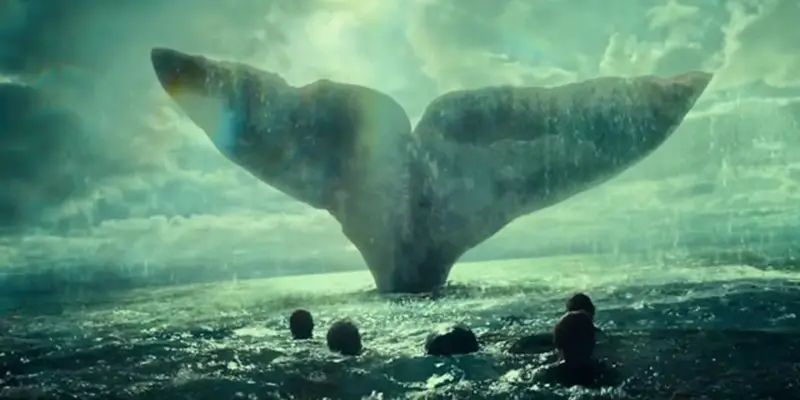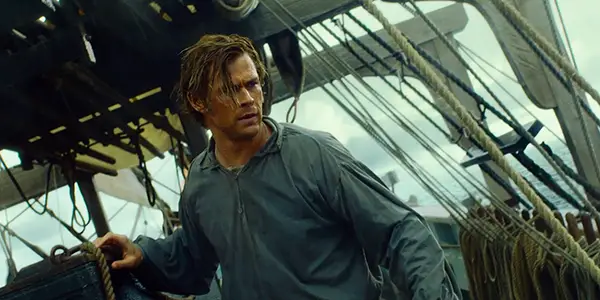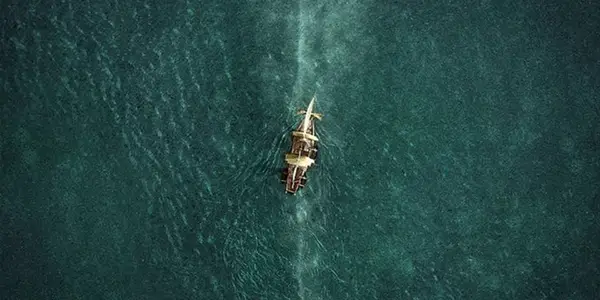IN THE HEART OF THE SEA: A Remarkable Story Told in an Unremarkable Manner

David is a film aficionado from Colchester, Connecticut. He enjoys…
In the Heart of the Sea was originally supposed to premiere in early 2015, but it was pushed to later in the year at the last second. Ron Howard hoped that more people would come out to see the film now as opposed to in early spring, since some other oceanic adventure films have seen success around this time (Life of Pi, for example).
It was my sincere hope that pushing the film to December was also because it would be worthy of premiering next to more awards-friendly films, which could mean that it was better than originally expected. But unfortunately, In the Heart of the Sea is an all-around disappointment. The film suffers from poor direction, an unfocused narrative, and some very underdeveloped characters.
“That Moby Dick movie”
Though known by a lot of people as “that Moby Dick movie,” In the Heart of the Sea is not actually based on Herman Melville‘s classic novel. It is instead based on the true incident that itself inspired the writing of Moby Dick. Such an idea is expressed in the film when Herman Melville (played by Ben Whishaw) seeks out a man named Thomas Nickerson (Brendan Gleeson), the sole survivor of the Essex, a ship that was brought down by a vengeful white whale. Nickerson explains the story to Melville in flashback, starting from when they boarded the ship, to the attack itself, and finally the aftermath, when the men are forced to do unfathomable things to survive.

At the start of his story, Nickerson first talks about a man named Owen Chase (Chris Hemsworth), a seasoned whaler who is also a natural leader. On their current ship, though (of which Nickerson was also present as a young kid), Chase is made first officer while George Pollard, Jr. (Benjamin Walker), a man clearly less experienced, is made captain. Their clash of superiority forms the backbone of the first real conflict of the film.
It’s here, though, that I realized In the Heart of the Sea was going to have some narrative issues. So is this a story of a whale or is it it a character drama set at sea? It could have easily been both if done properly, and if enough time was spent on developing one story before progressing to the next. But minimal time, if any, is spent on actually developing the characters of the men on board the ship, to the point where I wasn’t invested enough once the whale does attack. Nickerson’s character in the story, for example (played by Tom Holland), barely utters more than a few words in the entirety of these opening scenes.
The Whiteness of the Whale
Much like Melville himself, it’s clear that Ron Howard was almost exclusively interested in the story because of the whale. As such, it is these scenes where he spent the most time and effort, giving me at least some hope for the film. Though the white whale itself is an obvious CGI creation, the scene when it attacks the Essex is harrowing and tense enough. Howard portrays the creature as this angry, aggressive monstrosity, intent on nothing less than complete destruction of anything man-made.
Yet, rather than hate it, you almost sympathize with the animal, who only seems to be taking revenge against a crew that is trying with all their effort to end its life, and for nothing more than monetary gain. It is an almost righteous vengeance.

After the attack, though, In the Heart of the Sea once again slips into mediocrity. Now, it is not so much a story about a whale as it is a story about survival. The men become stranded on lifeboats, with minimal provisions to survive until they are able to reach civilization. At this point, the film was akin to other lost-at-sea survival tales, such as Life of Pi or All is Lost. Though vastly different in terms of tone, each of those films are engaging in their own way (Life of Pi is like a gorgeously shot acid trip, while All is Lost is a very interesting technical jargon of survival at sea).
Here, though, the experience is about as empty and vacuous as could be. Weeks go by and the crew seems just as fine as the last time we saw them. No interesting philosophical or moral connotations are really delved into. Even the more disturbing aspect of their survival is glossed over and only minimally spoken of. Perhaps the reason for this is because the film is rated PG-13, but all the same, to see such things spoken about but barely hinted at on screen doesn’t really make for good, tense cinema.
Conclusion
Which leads me to my conclusion. Though In the Heart of the Sea is based on an incredible true story, the film itself is a shallow and forgettable experience. It attempts to be a character drama, then a story about a whale, and then a story of survival; but by not spending adequate time on each specific act, the film spreads itself too thin. Not even the performances are enough to save it, as even such recognizably talented actors as Chris Hemsworth and Cillian Murphy are underused.
Ron Howard was clearly fascinated about this story because of the portion about the white whale. Why, then, not just adapt Moby Dick instead? If the whale story is the only one that you really care about, then it makes little sense to include the rest. And it’s obvious that this is what he wanted you to remember from the story because the film is actually told in flashback to Moby Dick’s author, Herman Melville, an aspect that I’m sure is not part of the non-fiction book that the film is based on.
It’s no wonder that people are referring to this as “that Moby Dick movie.” It’s just unfortunate that In the Heart of the Sea is not worthy of the name.
What did you think of In the Heart of the Sea? What are some of your favorite adventure at sea films?
In the Heart of the Sea is screening throughout the U.S., but U.K. audiences will have to wait until Boxing Day. Find international release dates here.
Does content like this matter to you?
Become a Member and support film journalism. Unlock access to all of Film Inquiry`s great articles. Join a community of like-minded readers who are passionate about cinema - get access to our private members Network, give back to independent filmmakers, and more.
David is a film aficionado from Colchester, Connecticut. He enjoys writing, reading, analyzing, and of course, watching movies. His favorite genres are westerns, crime dramas, horror, and sci-fis. He also enjoys binge-watching TV shows on Netflix.













